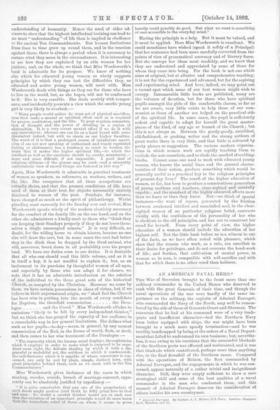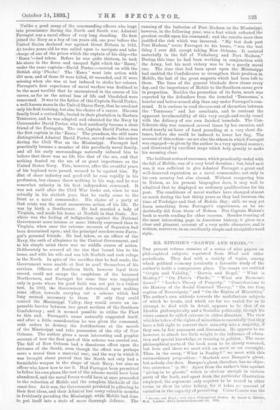AN AMERICAN NAVAL HERO.* THE War of Secession brought to
the front more than one military commander in the United States who deserved to rank with the great Generals of their time, and though the naval operations of the war were hardly of the same im- portance as the military, the exploits of Admiral Farra gut, who commanded the Navy of the North, may well be remem- bered by the side of those of Generals Grant and Sherman. The resources that he had at his command were of a very inade- quate and insufficient character—had the Northern Navy been better equipped with ships, the war might have been brought to a much more speedy termination—and he was terribly handicapped by being at the orders of a Naval Depart- mentthat failed to understand its own business ; but, neverthe- less, it was owing to his exertions that the successful blockade of the Southern ports was effected and maintained, and it was that blockade which contributed, perhaps more than anything else, to the final downfall of the Southern cause. Compared with the operations of Nelson, the fleet commanded by Admiral Farragut, and the engagements in which be was con- cerned, appear naturally of a rather trivial and insignificant character, Still, they were amply sufficient to show a rare strategical skill and some of the best qualities of a naval commander in the man who conducted them, and this memoir of Admiral Farragut deserves the consideration of others besides his own countrymen.
* Aduttrat Farragut. By Captain A. T. Mahan, U.S. Navy. London : Sampson Low, Marston, and Co.
'Unlike a good many of the commanding officers who leapt into prominence 'during the North and South war, Admiral Farragut, was a naval officer of very long standing. Ho first joined the Navy as a boy of ten years old, one year before the United States declared war against Great Britain in 1812. At twelve years old ho was called upon to navigate and take charge of one of the prizes which the captain of his ship—the Essex '—had taken. Before he was quite thirteen, he took his share in the fierce and unequal fight which the Essex,' under the same captain—David Porter,—carried on with the British ship Phcebe.' The 'Essex' went into action with 250 men, and of these 58 were killed, 66 wounded, and 31 were missing when she was at last induced to strike her colours. Farragut's first experience of naval warfare was destined to be the most terrible that be encountered in the course of his career, as far as the actual loss of life and bloodshed were concerned. It was to the father of this Captain David Porter, a well-known name in the United States Navy, that he owed not only his first training, but also his choice of a career. His own family lived a retired life, buried in their plantation in Eastern Tennessee, and he was adopted and educated for the Navy by Commander David Porter, who had accidently become a close friend of the Farraguts. The son, Captain David Porter, was the first captain in the ' Essex.' The grandson, the still more distinguished Admiral David Porter, served under his orders during the Civil War on the Mississippi. Farragut had practically become a member of this peculiarly naval family, and all his early surroundings naturally induced him to believe that there was no life like that of the sea, and that nothing floated on the sea of so great importance as the United States Navy. Fate, however, after the eventful years of his boyhood were passed, seemed to be against him. By dint of sheer industry and good-will he rose rapidly in his profession, but chance threw nothing in his way, and he was somewhat unlucky in his first independent command. It was not until after the Civil War broke out, when he was actually in his sixtieth year, that he really came to the front as a naval commander. His choice of a party at that crisis was the most momentous action of his life. He was by birth a Southerner. He bad married a lady of Virginia, and made his home at Norfolk in that State. No- where was the feeling of indignation against the National Government more intense or more bitterly expressed than in Virginia, when once the extreme measure of Secession had been determined upon ; and the principal seceders were Farra- gut's personal friends. He had taken, as an officer of the Navy, the oath of allegiance to the Central Government, and to his simple mind there was no middle course of action. Deliberately he severed all the ties that bound him to his home, and with his wife and son left Norfolk and took refuge in the North. In spite of the sacrifice that he had made, the Government were unable at first to avail themselves of his services. Officers of Southern birth, however loyal their record, could not escape the suspicions of the harassed Northerners, and Farragut for some time was employed only in posts where his good faith was not put to a violent test. In 1862, the Government determined upon making some effort towards carrying out a scheme which had long seemed necessary to them. If only they could control the Mississippi Valley, they would create an im- passable barrier between two great sections of the Southern Confederacy ; and it seemed possible to utilise the Fleet to this end. Farragut's name naturally suggested itself, and after a little consideration he was given the command, with orders to destroy the fortifications at the mouth of the Mississippi and take possession of the city of New Orleans. The author gives a most interesting and graphic account of how the first part of this scheme was carried out. The fall of New Orleans had a disastrous effect upon the fortunes of the South, even though the effect was perhaps more a moral than a material one; and the way in which it was brought about proved that the North not only had a formidable weapon in the shape of their Navy, but also an officer who knew how to use it, Had Farragut been permitted to follow his own plans, the rest of the scheme would have been abandoned, and the naval forces would have at once proceeded to the reduction of Mobile and the complete blockade of the coast-line. As it was, the Government persisted in adhering to their first ideas, and their Admiral lost many valuable months in fruitlessly parading the Mississippi, while Mobile had time to put itself into a state of more thorough defence. The running of the batteries of Port Hudson on the Mississippi, however, in the following year, was a feat which reflected the greatest credit upon his command ; and the results more than justified the risk which was incurred. "My last dash past Port Hudson," wrote Farragut to his home, " was the best thing I ever did, except taking New Orleans. It assisted materially in the fall of Vicksburg and Port Hudson." During this time he had been working in conjunction with the Army, but his next victory was to be a purely naval one. The time that had been spent upon the Mississippi had enabled the Confederates to strengthen their position in Mobile, the last of the great seaports which had been left to them. The lines of the general blockade drew closer every day, and the importance of Mobile to the Southern cause grew in proportion. Besides the protection of its forts, much was expected by the defenders from the ironclad ' Tennessee,' a heavier and better-armed ship than any under Farragut's com- mand. It is curious to read the account of the action between the Tennessee' and her assailants, and to contrast the apparent invulnerability of this very rough-and-ready vessel with the delicacy of our own finished ironolads. The Con- federate ship was rammed several times by her enemies, and stood nearly an'honr of hard pounding at a very short dis- tance, before she could be induced to lower her flag. The account of this action—as are also the others in which Farragut was engaged—is given by the author in a very spirited manner, and illustrated by excellent maps which help greatly to make his meaning clear.
The brilliant series of successes, which practically ended with the fall of Mobile, was of a very brief duration ; but, brief as it was, it was sufficient to give Admiral Farragut a great and well-deserved reputation as a naval commander, not only in his own country but also abroad. Without comparing him to Nelson, as his present biographer does, it may well be admitted that he displayed no ordinary qualifications for his post. The conditions of naval warfare have changed almost as much during the last thirty years as they had between the time of Trafalgar and that of Mobile Bay ; still, we may yet learn something from Farragut's experiences, as he un- doubtedly did from those of Nelson. But Captain Mahan's book is worth reading for other reasons. Besides treating of the most interesting page in American history, it gives us a clear and pleasant account of a very noble character, and is written, moreover, in an excellently simple and straightforward style.



















































 Previous page
Previous page